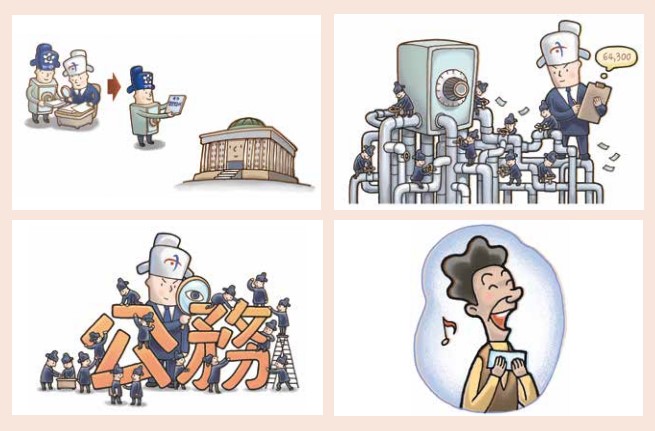Many folk tales of ancient Korea tell about Amhaeng-eosa, a secret royal inspector, the avenger for the people exploited by corrupt officials. Appointed by the king he was sent to local provinces to monitor government officials and look after the populace while traveling incognito.
After the secret surveillance was completed, he reveals himself by presenting mapae —the horse medallion—and inspecting the magistrate's office and records. After the completion of his mission, the inspector returns to the capital and presents a report to the king.
Today the horse medallion represents the identity of the modern Korea Board of Audit and Inspection (BAI), the Supreme Audit Institution (SAI) of South Korea that “strives to build a fair and clean government.”
Though the medallion is only symbolic, it nevertheless embraces the determination of BAI to be a institution that works directly with citizens to resolve issues.
The World Bank Group has traditionally supported Supreme Audit Institutions (SAIs) in client countries to develop their institutional capacities to “watch” over government accounts, operations and performance. In recent years our support has increasingly included assistance to SAIs to enhance their citizen engagement strategies in order to strengthen the overall impact of audit processes.
The Korea Board of Audit and Inspection (BAI) is one of the pioneer audit institutions in leveraging the capacity of citizens and civil society organizations (CSOs) to enhance the impact of public external audits. It is also increasingly looking for innovative ways to scale up this engagement at various stages of the audit cycle and to share BAI knowledge and experience with other countries.
Given the shared interest in this agenda, a Memorandum of Understanding was signed between the Korea Board of Audit and Inspection (BAI) and the World Bank Group on December 7 to collaborate on fostering citizen engagement in the audit process in Bank client countries, building on BAI’s own extensive experience with leveraging citizen engagement to enhance external oversight and public accountability.
“Citizen Engagement is now a corporate priority for the World Bank Group (WBG), encapsulated in our WBG Strategic Framework for Citizen Engagement. And empowering citizens to hold their governments accountable for the effective and efficient use of public funds is increasingly at the core of robust public financial management systems and of great relevance for the work of our Governance Global Practice (GGP) of the World Bank,” said Jan Walliser, vice president for Equitable Growth, Finance and Institutions, of the World Bank.
He also noted that this collaboration with BAI is well aligned with the mandate of the GGP to enhance public financial accountability and transparency in client countries and with our broader support to Supreme Audit Institutions (SAI)s.
While there are several models of SAI-citizen engagement on which the Bank draws to support its clients, the lessons from the BAI model are among the most in demand.
BAI's innovative approach to involving citizens in the audit process implies a process where a group of citizens over 300, or civil society organizations whose members are over 300, can formally request BAI to conduct an audit on specific issues of public interest. BAI now receives annually 180 to 200 audit requests and over 10 thousand petition and complaints from citizens.
The increased number of audit requests suggests that citizens and CSOs view the participatory audit system as an important vehicle to oversee the government and enhance its transparency and accountability. And it contributes to maturing participatory democracy by providing citizens opportunities to become more active in raising their voices against government mismanagement.
Since SAIs mandate is to “watch” over government accounts, operations and performance, they are natural partners of citizens in exercising public scrutiny. Both BAI and the WB recognize that engaging citizens in the audit process is fraught with potential complications due to the formal mandate of SAIs and lack of capacity to productively collaborate. That’s why capacity building and technical support on "how to" is relevant for SAIs in client countries. The recently signed MoU will help expand existing knowledge in this area while strengthening the capacity of client SAIs to engage the public, and increase value for money and development impact.
“I know there are some concerns that promoting citizen engagement in audits might compromise the independence, the most crucial value for the Supreme Audit Institution (SAI). However, the independence here does not mean that we shut our eyes and ears to citizen’s demand and expectation in the SAI. Rather, the SAIs have to keep eyes and ears open to our citizens while retaining such independence at the same time” said Commissioner Ryu during the signing ceremony.
The Bank has a strong global partnership with the community of supreme audit institutions. The BAI-GGP collaboration on this agenda will help inform dialogue on the need for stronger emphasis on participatory audits within the relevant technical and regional committees.
SAIs and CSOs in the Africa, MENA and South Asia Regions have recently benefited from learning about BAI experience. Many other client countries like Georgia, Tunisia, and Kenya have expressed strong interest in deeper knowledge exchanges on specific aspects of the Korea model such as the ICT-based citizen engagement platform.
Finally, while the MoU focuses on collaboration between both organizations on the citizen engagement agenda it will bring new opportunities to engage on other areas of common interest as indicated by Commissioner Ryu. “I expect that in addition to promoting the public participation in audits, both organizations will further expand mutual exchange and cooperation in a wider range of issues in the future”.

